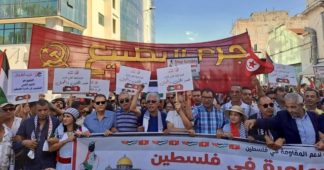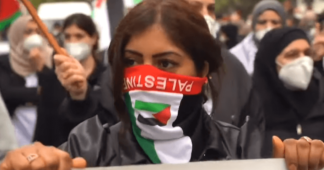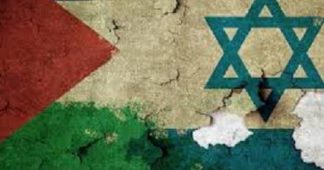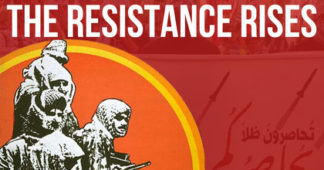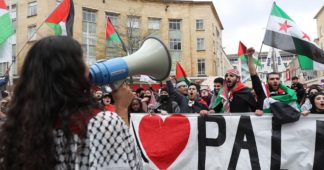Across West Asia and North Africa, massive protests have been staged in solidarity with the Palestinian people and to protest the criminal Israeli attacks on Gaza
by Zoe Alexandra
October 28, 2023
Since October 7, hundreds of thousands of people have participated in demonstrations in cities across North Africa and West Asia in solidarity with the Palestinian people’s resistance to occupation, and in rejection of Israel’s genocidal war against Gaza.
One of the key slogans and demands by people across the region, in addition to Israel immediately ending its siege and blockade of Gaza, is for their governments to end normalization with Israel or to take measures to block any possibility for normalization.
“Normalization” refers to the broad process where countries in the region have, through different agreements, mechanisms, or actions, recognized Israel and established a diplomatic relationship with it. It is a historic process which includes the peace agreements with Jordan and Egypt, but it has intensified in recent years under the initiative of former US President Donald Trump. In September 2020, the United Arab Emirates and Bahrain signed the Abraham Accords, mediated by the US government under Trump, which saw them end their historic policy of no diplomatic relationship with Israel. Morocco and Sudan were soon to follow.
Normalization is in direct violation of the Arab Peace initiative of the Arab League which established that no member would normalize relations until Israel withdraws from the occupied territories (West Bank, Gaza, the Golan Heights, and Lebanon), addresses the Palestinian refugee issue based on UN Resolution 194, and establishes a Palestinian state with East Jerusalem as its capital.
Additionally, normalization is highly unpopular among the people in the region who not only feel a historic relationship of support and solidarity with the Palestinian people, but also see how the process emboldens imperialism in the region and the local ruling class. In January 2023, with this understanding and the growing indignation over continued atrocities by Israel against the Palestinian people, youth from people’s movements and left parties from across the region formed the Arab and Maghreb Youth Student Front Against Normalization and in Support of People’s Causes.
The coordinator of the Youth Front, Ayoub Habraoui spoke to Peoples Dispatch about the protests seen today across the region in support of Palestine and the youths’ understanding of the role played by zionism in collusion with imperialism across the region.
Peoples Dispatch: What has been the response across the Arab and Maghreb region to the Israeli bombing of Gaza? How have the youth of the region responded?
Ayoub Habraoui: Since the Zionist terrorist operations began in Gaza, the Arab and Maghreb peoples have reacted to the tragic events we are seeing every day in the media, and confirming that actual terrorism is being committed by Israel under the sponsorship of the United States. Since the bombardment started, the peoples of the region have held massive protest rallies and marches, condemning the audacity practiced by Israel against the resilient residents of Gaza. They demanded Arab and Maghreb regimes to support Gaza and the resistance and to halt relations and normalization with the Zionist entity.
The youth played a significant role in these protests and uprisings in all Arab and Maghreb countries. Daily student marches from colleges head to Zionist embassies or embassies of countries supporting them. Media-wise, the youth also play a vital role in conveying the voice of the Palestinian people who suffer from significant media blackout due to the imperial powers supporting Zionism in social media, especially. Unifying the Arab and Maghreb youth’s voice is necessary in the face of the false Zionist propaganda, backed by imperial forces, claiming that Israel is defending itself against terrorist attacks carried out by resistance organizations.

PD: Why do youth in the region see Palestine as a national cause?
AH: I will begin my response to the question with a quote from George Habash: “The best contribution you can make to the Palestinian cause is your struggle against your retrogressive regimes.” The liberation of Palestine cannot happen without a drastic change in the Arab and Maghreb countries.
These puppet regimes have directly or indirectly strengthened Zionism by not supporting the Palestinian people in their resistance and by their silence or weak public stances, as we see now, attempting to bury both popular and armed resistance. Moreover, this entity doesn’t only pose a threat to Palestine but to the entire region. There will be no peace in the Arab and Maghreb region, especially in the Middle East, without Israel’s withdrawal and the establishment of an independent Palestinian state from the river to the sea.
Additionally, we believe that the religious and nationalist understanding of the issue does not serve Palestine’s interests. Therefore, the Palestinian cause must be approached from an international and national perspective. The essence here is that as long as Palestine is occupied, no country is free. As long as there are children sleeping and waking up under the rubble of bombings, we cannot talk about freedom and the world of democracy. Our struggle now must be a clear struggle against its systems to liberate our people, contributing to the liberation of Palestine.
PD: The youth front against normalization sees Zionism as a key partner of imperialism and local oligarchies in the region. How does this play out in the political life of the region? What kind of benefits did imperialism and local oligarchies get from normalizing relations with Israel?
AH: The establishment of Israel in 1948 occurred within the context of imperialistic interventions in the Middle East. Following World War I and the collapse of the Ottoman Empire, British and French imperial powers heavily intervened in the region. With the support of these powers, Zionists decided to establish a Zionist state in Palestine. This decision caused significant discontent among Arab countries and Muslims in the region, viewing it as serving imperialist interests at the expense of Palestinian rights.
Israel’s presence in the region led to increased instability and continuous tensions. Israeli-Arab conflicts and ongoing tensions further ignited conflicts in the region, prompting imperial powers to establish American military bases in the area to safeguard their interests and maintain their presence in the Middle East.
Regarding normalization with Israel, this move aimed at a key objective for imperialism: enhancing its influence and benefitting from the region. Some Arab nations normalized relations with Israel in exchange for recognition of sovereignty over specific territories. This normalization allowed imperialism to strengthen its presence and control in the region, opening avenues for economic cooperation and investments. Imperial powers capitalized on the relative stability brought by normalization, seeking to reinforce financial and economic ties with regional countries, capitalizing on the economic and political opportunities arising from this normalization.
Youth in the Arab and Maghreb Youth Student Front Against Normalization and in Support of People’s Causes are part of an international day of action on November 4 in support of Palestine and to demand an immediate ceasefire.
We remind our readers that publication of articles on our site does not mean that we agree with what is written. Our policy is to publish anything which we consider of interest, so as to assist our readers in forming their opinions. Sometimes we even publish articles with which we totally disagree, since we believe it is important for our readers to be informed on as wide a spectrum of views as possible.
